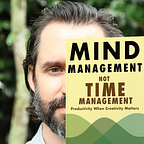Uh, like, you know
Four months ago, I decided I wanted to eliminate three words from my speech: Uh, like, and you know.
These words (and fillers like them) 1) make the speaker convinced they are actually saying something of substance, and 2) prevent the speaker from making the mental connections required to find the appropriate words to say something of substance.
I understand the appeal of these words. Converting your thoughts into speech can feel like trying to take a picture of The Grand Canyon — distilling a vast, immersive landscape of synapse firings into a flat rectangle. It can be as disappointing as it is frustrating.
But, until we’re plugging our brains into one another, real words are one of the most powerful tools we have to make that translation. Uh, like, and you know not only do nothing to make that translation, but I posit there’s something about saying them that fools one’s brain into believing it just accomplished the feat of communicating. You know (“ah, there we go, now she knows”); like (“I just said it was like the chaotic mess of electrical activity I’m experiencing right now — I have communicated my point”); Uhh is just a tic.
What follows is the real danger of these fillers: a sense of satisfaction on the part of the speaker. They get a hit of dopamine and a spark of positive emotion as if they just did something good. Their emotional reaction overpowers their own rational thought. Repeated many times over, this adds up to a huge problem for humanity.
Don’t believe me? Watch this GIF:
I had long felt a dislike for an overuse of these fillers, but it wasn’t until I was recording the first few episodes of my podcast that I recognized how damaging they were. I may have completed an interview, or recorded an intro, felt good about it, but — upon listening to the recording — discovered that there were vast sections where I said damn near nothing. Uh, like, you know had hijacked my brain, the same way alcohol makes you think you’re good at karaoke.
But, I gradually got better. Here are some of the tricks I used:
- Find a speaker role model. You may have your own, but I can’t think of anyone better than Sam Harris. If he needs to think about something, he just pauses. What follows is perfectly-formed sentences and paragraphs that are exhaustive and rationally sound.
- Listen to your speaker role model — repeatedly, if needed.
- Stop saying uh, like, you know. Which is easier said than done. Just pause, take the time to formulate a sentence, then speak.
- Think. Make the space to think. Thinking is a thing. You need to question your assumptions and formulate a cohesive world view. It will make all of the difference in the fluidity of your thought, and the coherence of your speech.
I still say uh, like, you know much more than I would like. Maybe my Pavlok can help me with that.
Like, listen to my podcast, Love Your Work. What will happen is, uh, like, you know, uhhhhh…. Subscribe on iTunes, or listen to the interview with Jason Fried.
